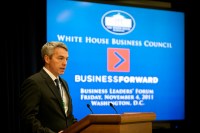CEO of Dow Andrew Liveris (L) watches President Barack Obama sign the Korea Free Trade Agreement in the Oval Office of the White House on October 21, 2011. Dow is a Business Forward member.
Corporate cash will not be funding the next iteration of Barack Obama’s grassroots army. On Wednesday, former advisers to the President’s reelection campaign decided to reverse an earlier decision to accept unlimited funds from corporations for Organizing for Action, a new non-profit group that aims to bring on-the-ground and advertising support to the President’s second term agenda. “We have decided not to accept donations from corporations, federal lobbyists and foreign donors,” writes former Obama campaign manager Jim Messina, in an op-ed on CNN Thursday.
But individuals will still be able to give unlimited checks, and top donors who donate or bundle funds in the $500,000 range will get to sit on a national advisory board that is expected to get regular briefings from White House officials, including possibly the President himself.
Don’t feel to bad for the corporations, however. A separate non-profit group that has been arranging meetings between American business and Obama administration officials for years is planning to expand its efforts.
“We see a huge opportunity,” says Jim Doyle, the president of Business Forward, a group founded in 2009 by supporters of the White House. “For the next few years there will be much more alignment between the business community and the administration.”
Business Forward is a sort of hybrid organization in the world of Washington influence, part access broker and part outreach facilitator. It’s budget of about $2 million a year is funded mainly by large corporations who pay $50,000 or $25,000 a year to be invited to regular events set up with the White House to talk about specific issues, like health care reform, cyber security and immigration reform. “We want to avoid the pomp and circumstance and get into a discussion of medical device taxes,” explains Britney Sussman, a spokeswoman for the group. These companies include who’s who of Fortune 500 powerbrokers in D.C., including Dow, AT&T, Comcast, Citigroup, Google, Ford, McDonalds and TIME magazine’s parent company, Time Warner.
But all of the events have non-exclusive component. Other non-paying business leaders, often regional mid-sized and small businesses, are invited as well, as a sort of charitable mission. “Our target market are entrepreneurs, investors and small business leaders,” says Doyle. The group tries to set up mentor relationships between larger and smaller companies as well to help navigate federal public policy issues. “For every [event] in D.C., we do 20 somewhere else in the country,” says Sussman. Last year, the group helped arranged visit to the White House for 2,000 business leaders, and the group has arranged meetings with 250 Obama administration officials.
The group is feeling bullish about the President’s second term, and all signs point to continued White House cooperation. “We are tripling our size in terms of our staff,” says Doyle. Since the election concluded, the group has hired three former officials from Obama’s reelection campaign: Greg Shultz, the former Ohio state director; Diana Doukas, a former campaign fundraiser; and Tom Reynolds, one of the regional media specialists.
After Organizing for Action announced its initial intent to take corporate donations, some lobbyists in town speculated that the new organization would create a new tier of access for companies willing to give higher amounts of money. (The suggested $500,000 buy-in figure to sit on Organizing for Action advisory board is ten times the membership cost of Business Forward.) But former Obama advisers were bombarded with criticism for their plans, including stinging editorials from the New York Times and the Washington Post.
The new rules announced Thursday do not eliminate the risk of monied interests buying access and influence–or the appearance of the same–by giving large sums to Organizing for Action. Organizers have not backed off discussions about having senior officials at the White House, including the President, attend events for the group, with special briefings for top donors. But the announcement does suggest a quick return to the presidential high-money corporate donation days of the 1990s is not immediately at hand. Back then many of the nation’s top for-profit companies were expected to give large checks is so-called “soft money” to the national political parties. The donations typically coincided with special access to events with the President and his aides.
The announcement Thursday by Messina did not address directly the question of whether the new group, Organizing for Action, will accept contributions from non-profit foundations and labor unions. The group plans to hold a summit for organizers and donors in Washington later this month.


